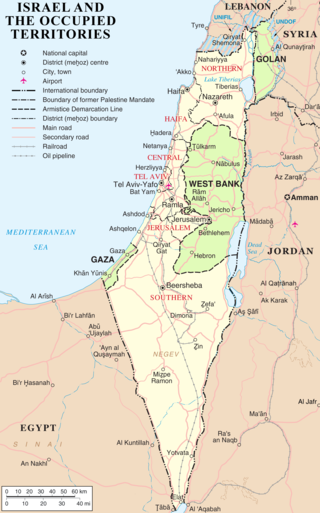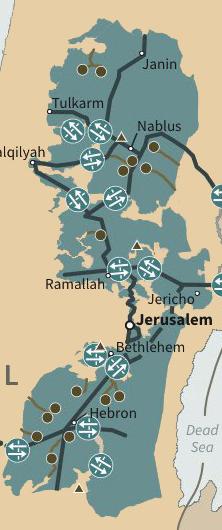
The Gaza Strip, or simply Gaza, is a Palestinian exclave on the eastern coast of the Mediterranean Sea. The smaller of the two Palestinian territories, it borders Egypt on the southwest for 11 kilometers (6.8 mi) and Israel on the east and north along a 51 km (32 mi) border. Together, the Gaza Strip and the West Bank make up the State of Palestine, while being under Israeli military occupation since 1967.

Israeli settlements, or Israeli colonies, are civilian communities inhabited by Israeli citizens, exclusively of Jewish ethnicity, built on lands occupied by Israel in the 1967 Six-Day War. The international community considers Israeli settlements to be illegal under international law, though Israel disputes this.

The West Bank is a landlocked territory near the coast of the Mediterranean in Western Asia that forms the main bulk of the Palestinian territories. It is bordered by Jordan and the Dead Sea to the east and by Israel to the south, west, and north. Under an Israeli military occupation since 1967, its area is split into 165 Palestinian "islands" that are under total or partial civil administration by the Palestinian National Authority (PNA), and 230 Israeli settlements into which Israeli law is "pipelined". The West Bank includes East Jerusalem. Israel administers the West Bank excluding East Jerusalem as the Judea and Samaria Area district.

The Israeli–Palestinian conflict is one of the world's most enduring conflicts, beginning in the mid-20th century. Various attempts have been made to resolve the conflict as part of the Israeli–Palestinian peace process, alongside other efforts to resolve the broader Arab–Israeli conflict. Public declarations of claims to a Jewish homeland in Palestine, including the First Zionist Congress of 1897 and the Balfour Declaration of 1917, created early tensions in the region. Following World War I, the Mandate for Palestine included a binding obligation for the "establishment in Palestine of a national home for the Jewish people". Tensions grew into open sectarian conflict between Jews and Arabs. The 1947 United Nations Partition Plan for Palestine was never implemented and provoked the 1947–1949 Palestine War. The current Israeli-Palestinian status quo began following Israeli military occupation of the Palestinian territories in the 1967 Six-Day War.

The Palestinian territories are the two regions of the former British Mandate for Palestine that have been militarily occupied by Israel since the Six-Day War of 1967, namely: the West Bank and the Gaza Strip. The International Court of Justice (ICJ) has referred to the West Bank, including East Jerusalem, as "the Occupied Palestinian Territory", and this term was used as the legal definition by the ICJ in its advisory opinion of July 2004. The term occupied Palestinian territory was used by the United Nations and other international organizations between October 1999 and December 2012 to refer to areas controlled by the Palestinian National Authority, but from 2012, when Palestine was admitted as one of its non-member observer states, the United Nations started using exclusively the name State of Palestine. The European Union (EU) also adopts the term occupied Palestinian territory, with a parallel term Palestinian Authority territories also occasionally used.

Palestine, officially the State of Palestine, is a state located in Western Asia. Officially governed by the Palestine Liberation Organization (PLO), it claims the West Bank, including East Jerusalem, and the Gaza Strip as its territory, though the entirety of that territory has been under Israeli occupation since the 1967 Six-Day War. As a result of the Oslo Accords of 1993–1995, the West Bank is currently divided into 165 Palestinian enclaves that are under partial Palestinian National Authority (PNA) rule; the remainder, including 200 Israeli settlements, is under full Israeli control. The Gaza Strip has been ruled by the militant Islamic group Hamas and has been subject to a long-term blockade by Egypt and Israel since 2007.

East Jerusalem is the sector of Jerusalem that was held by Jordan during the 1948 Arab–Israeli War, as opposed to the western sector of the city, West Jerusalem, which was held by Israel. Under international law, East Jerusalem is considered a part of the West Bank and, therefore, of the Palestinian territories. A number of states currently recognize East Jerusalem as the capital of the State of Palestine – such as Argentina, Brazil, China, Russia, as well as all 57 members of the OIC –, whereas other states – such as Australia, Finland, France an others – defend that East Jerusalem "will be the capital of Palestine", while referring to East Jerusalem at present as "an occupied territory".
Issues relating to the State of Israel and aspects of the Arab–Israeli conflict and more recently the Iran-Israel conflict occupy repeated annual debate times, resolutions and resources at the United Nations. Since its founding in 1948, the United Nations Security Council, has adopted 79 resolutions directly related to the Arab–Israeli conflict as of January 2010.

United Nations Security Council resolution 446, adopted on 22 March 1979, concerned the issue of Israeli settlements in the "Arab territories occupied by Israel since 1967, including Jerusalem". This refers to the Palestinian territories of the West Bank, East Jerusalem and the Gaza Strip as well as the Syrian Golan Heights.

The Israeli–Palestinian peace process refers to the intermittent discussions held by various parties and proposals put forward in an attempt to resolve the ongoing Israeli–Palestinian conflict. Since the 1970s, there has been a parallel effort made to find terms upon which peace can be agreed to in both the Arab–Israeli conflict and in the Palestinian–Israeli conflict. Some countries have signed peace treaties, such as the Egypt–Israel (1979) and Jordan–Israel (1994) treaties, whereas some have not yet found a mutual basis to do so.
The Green Line, (pre-)1967 border, or 1949 Armistice border, is the demarcation line set out in the 1949 Armistice Agreements between the armies of Israel and those of its neighbors after the 1948 Arab–Israeli War. It served as the de facto borders of the State of Israel from 1949 until the Six-Day War in 1967.

Israeli-occupied territories are the lands that were captured and occupied by Israel during the Six-Day War of 1967. While the term is currently applied to the Palestinian territories and the Golan Heights, it has also been used to refer to areas that were formerly occupied by Israel, namely the Sinai Peninsula and southern Lebanon. Prior to Israel's victory in the Six-Day War, governance of the Palestinian territories was split between Egypt and Jordan, with the former having occupied the Gaza Strip and the latter having annexed the West Bank; the Sinai Peninsula and the Golan Heights were under the sovereignty of Egypt and Syria, respectively. The first conjoined usage of the terms "occupied" and "territories" with regard to Israel was in United Nations Security Council Resolution 242, which was drafted in the aftermath of the Six-Day War and called for: "the establishment of a just and lasting peace in the Middle East" to be achieved by "the application of both the following principles: ... Withdrawal of Israeli armed forces from territories occupied in the recent conflict ... Termination of all claims or states of belligerency and respect for and acknowledgment of the sovereignty, territorial integrity and political independence of every State in the area and their right to live in peace within secure and recognized boundaries free from threats or acts of force."

This article is about the demographic features of the population of the area which is commonly described as Palestinian territories and includes information on ethnicity, education level, health of the populace, economic status, religious affiliations and other aspects of that population.
The Israeli government is accused by international, Israeli and Palestinian rights groups of committing the crime of apartheid under the 2002 Rome Statute of the International Criminal Court, both in the occupied Palestinian territories and, by some, in Israel proper. Israel and its supporters deny the charges.
Issues relating to the State of Palestine and aspects of the Israeli–Palestinian conflict occupy continuous debates, resolutions, and resources at the United Nations. Since its founding in 1948, the United Nations Security Council, as of January 2010, has adopted 79 resolutions directly related to the Arab–Israeli conflict.

Richard Anderson Falk is an American professor emeritus of international law at Princeton University, and Euro-Mediterranean Human Rights Monitor's Chairman of the Board of Trustees. In 2004, he was listed as the author or coauthor of 20 books and the editor or coeditor of another 20 volumes. Falk has published extensively with multiple books written about international law and the United Nations.
Racism in the Palestinian territories encompasses all forms and manifestations of racism experienced in the Palestinian Territories, of the West Bank, Gaza, and East Jerusalem, irrespective of the religion, colour, creed, or ethnic origin of the perpetrator and victim, or their citizenship, residency, or visitor status. It may refer to Jewish settler attitudes regarding Palestinians as well as Palestinian attitudes to Jews and the settlement enterprise undertaken in their name.

The Trump peace plan, officially titled "Peace to Prosperity: A Vision to Improve the Lives of the Palestinian and Israeli People", was a proposal by the Trump administration to resolve the Israeli–Palestinian conflict. President Donald Trump formally unveiled the plan in a White House press conference alongside Israeli Prime Minister Benjamin Netanyahu on 28 January 2020. The plan had been delayed by two years and previously rejected by the Palestinians, who were not invited to the meeting.

The Palestinian enclaves are areas in the West Bank designated for Palestinians under a variety of U.S. and Israeli-led proposals to end the Israeli-Palestinian conflict. The enclaves are often compared to the nominally self-governing black homelands created in apartheid-era South Africa, and are therefore referred to as bantustans. They have been referred to figuratively as the Palestinian archipelago, among other terms.












